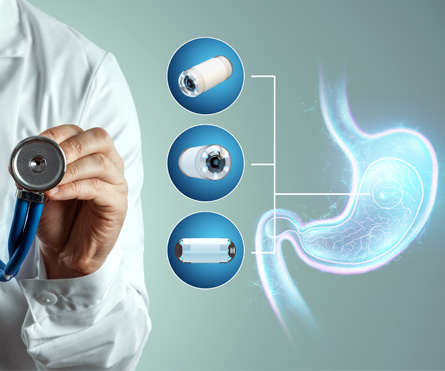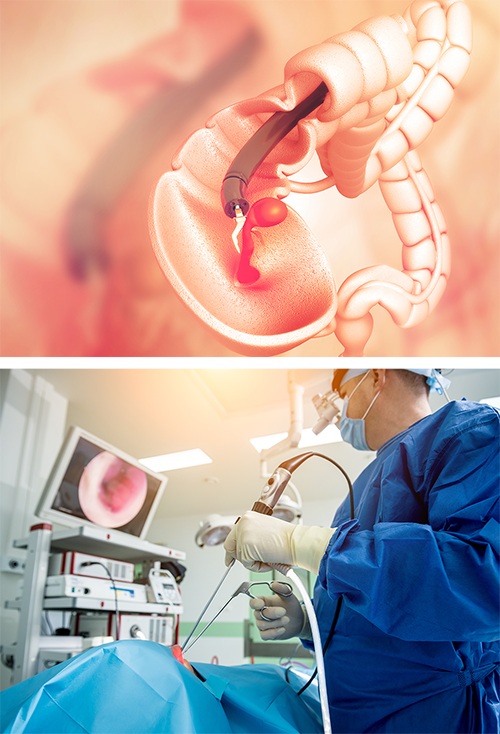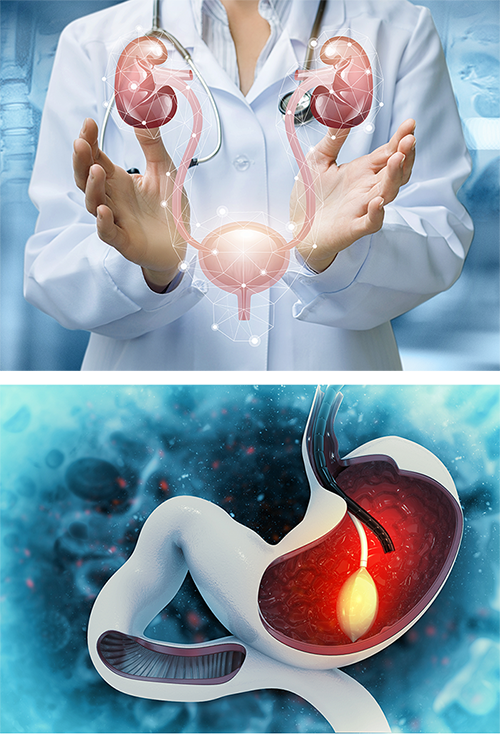
This is a highly specialized unit with advanced diagnostic as well as therapeutic endoscopy facility, state-of-the-art equipment and highly skilled gastroenterologists.
We carry out majority of the major endoscopy and radiology assisted procedures for gastrointestinal, liver and bilio-pancreatic disorders.
This super-specialty department involves management of patients suffering from disorders of digestive system and liver. These patients may be suffering from simple problems like indigestion, bloating, constipation, pain in abdomen, diarrhoea, jaundice or difficult problems like blood in the vomit or stools, liver failure, cirrhosis, ascites, bile duct stones, cancers of gall bladder, pancreas, food pipe, stomach or intestine.
Specialized technical staff, passionate doctors and compassionate nursing staff with support of most modern equipment and serene environment of hospital fasten recovery in chronically gastrand liver patients.
We strive tmake endoscopy a pleasant experience for all patients, with attention tsmall details including lockers for personal belongings, clean clothes and towels, clean toilet facilities, and post-procedure discussion of the findings. Our smiling and pleasant staff is trained tput patient apprehensions at ease.
We assure our patient all endoscopic procedures without pain and without bad memories.
The goal of endoscopy services at SUHRC is amalgamation of cutting edge technology with a humane touch.


The Institute provides outdoor services daily on all working days from 8:30 AM to 4:30 PM (except Sunday/holidays). Institute has all category wards from economy to single/deluxe rooms. The Institute caters to emergencies by attending to patients presenting various GI and liver emergencies. There is round the clock availability of doctors to treat these patients. The Institute is ably supported by the ICU and GI surgery.
Patient requiring or sometimes not liking prolonged hospitalisation can be given treatment in day care facility.
The SYMBIOSIS HOSPITAL AND RESEACH CENTRE is one of the few hospitals in Pune, which is actively involved in research in the field of gastrointestinal and liver diseases.
Endoscopy can be done under the effect of anaesthesia, which is usually SGA (short general anaesthesia). As the name suggests, SGA is anaesthesia given for short duration (for few minutes). SGA have very little side effects and very little risk involved. Endoscopy done under effect of anaesthesia, can be completely pain free and moreover, the effect of anaesthesia can help to avoid forming bad memories (amnesia of procedure). Endoscopy has minimal risk and very few serious side effects.
Endoscopy procedures have developed over the years due to human curiosity to see things themselves rather than rely on images and shadows in radiology. Upper GI endoscopy started as gastroscopy to look at the upper GI tract, and later, colonoscopy developed to look at the colon. Soon these procedures brought therapeutics into practice by offering excellent solutions to GI bleeding problems, removing precancerous tumours and dilating the narrowed pipes. Over the years, we saw its extension to pancreatic-biliary endoscopy by ERCP and therapeutics in that area, from removing stones to taking care of narrowed tubes and plugging the leaks.
The endoscopy procedure involves passing a long, thin tube called an endoscope through a natural opening in a patient's body, such as the mouth. An endoscope has a tiny camera attached to the end. It transmits a video to a display screen, allowing the doctors to examine the lining of the upper GI tract up close. Air is pumped into the patient's stomach and duodenum through the endoscope, making them easier to view.
The time required for diagnostic upper GI endoscopy is usually is 3-5 min and that for diagnostic colonoscopy around 15-20 min. Biopsies if needed may requires additional couple of minutes.
GI Endoscopy helps in the detection of inflammation, ulcers, and tumours. Upper GI endoscopies are more accurate than X-rays at detecting cancerous growths and examining the upper digestive system.
Dyspepsia is another word for indigestion. People with chronic indigestion often report feelings of stomach pain, over-fullness and bloating during and after eating. Other common symptoms include acid reflux, heartburn and excessive burping. Dyspepsia although mostly benign, can be the first sign of serious illnesses like GI malignancy.
Screening for health problems is considered the best investment. It has analogy with mutual funds. If one screens oneself for illness and one could get the problem detected early, one could save large amount of money, which would otherwise be required for treatment of disease. Moreover, it could extend life and improve the quality of life. Screening endoscopies and colonoscopies are routine in western countries, where they detect diseases at a very early stage and hence treat at early stage. For e.g. cancer detected at first stage can be completely curable, while detected at last stage may not have a cure. Money spent for stage III/stage IV cancer can be much more compared to money spent for stage I disease. English proverb “stitch in time, saves nine” is really true. India should also move to next level, where screening by endoscopy of high risk population (people with history of cancers in family) or elderly population (when risk of cancers increases) should be done. Indian people who are health conscious and can afford it, conscious should undergo periodic screening for diseases.
The division of colorectal surgery in SUHRC offers comprehensive surgical care to patients with benign and malignant diseases of the colon, rectum anal canal. The Colorectal Surgeon at the SUHRC is an expert in both surgical and nonsurgical treatment of colorectal diseases. Emergency and elective procedures pertaining to the colon, rectum, and anus are performed by a dedicated team of gastroenterologists specially trained and experienced in Colorectal Surgery. With more advanced imaging and technologies like the HD system and ICG system in laparoscopy, it has only become better for the patient in terms of outcomes and recovery, and to the surgeon in terms of ease and comfort. Using these technologies and expertise, our team has successfully been able to avoid colostomy/ ileostomy, with sphincter preservation for patients who otherwise might have needed a colostomy for rectal cancer surgery.
COLON : Radical Colectomy, Hemicolectomy, Subtotal
RECTUM : Anterior Resection (AR), Abdominoperineal Resection (APR), Sphincter preserving surgery (ISR), Laparoscopic Surgeries performed minimally invasive in Proctology
IBD/FAP : Total Proctocolectomy with ileal pouch anal anastomosis
DIVERTICULITIS : Sigmoidectomy
RECTAL PROLAPSE : Mesh rectopexy